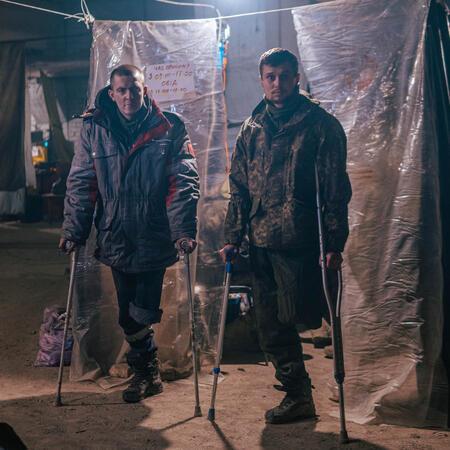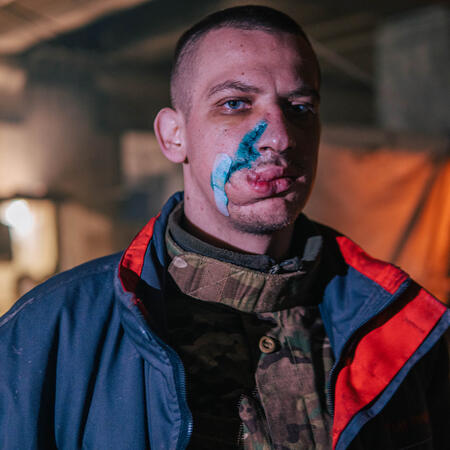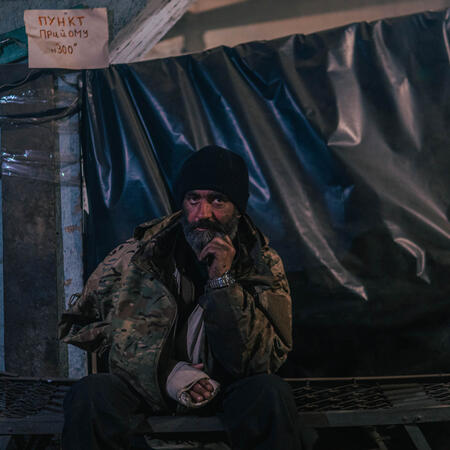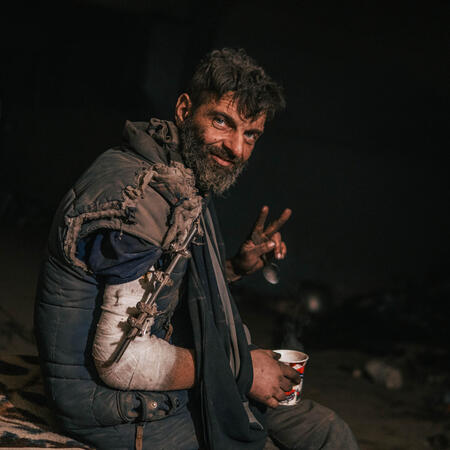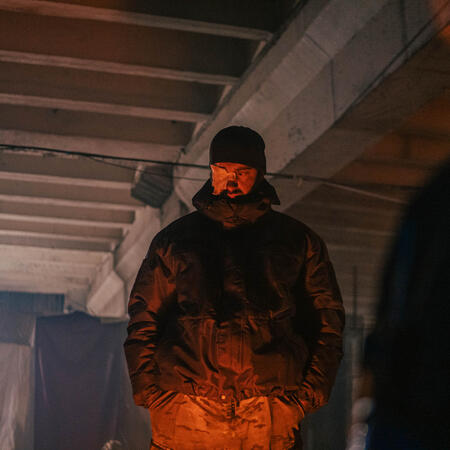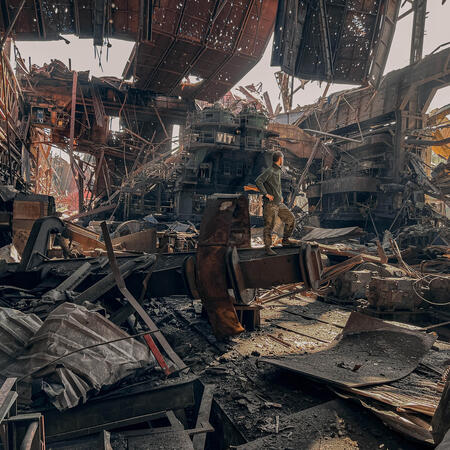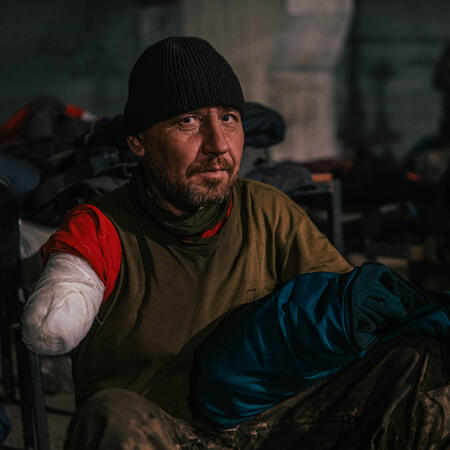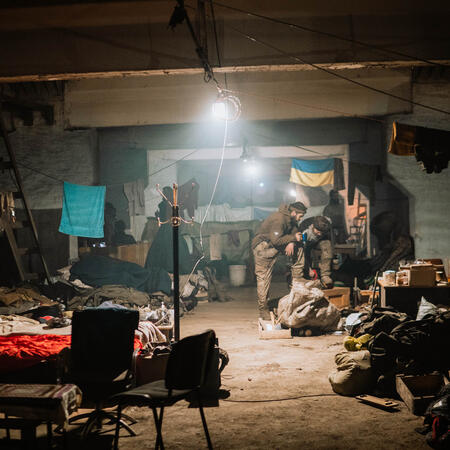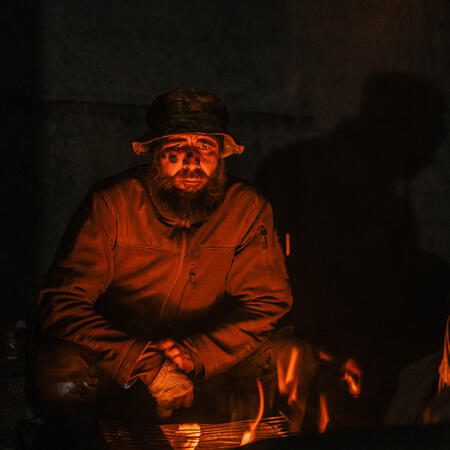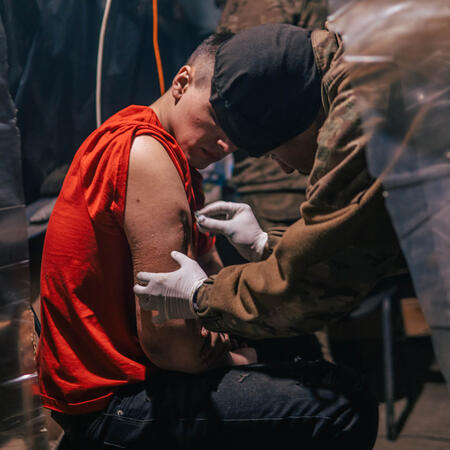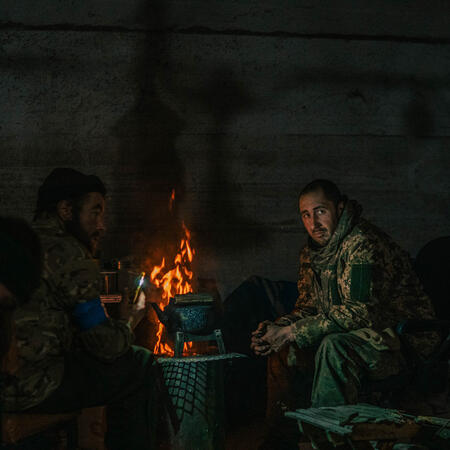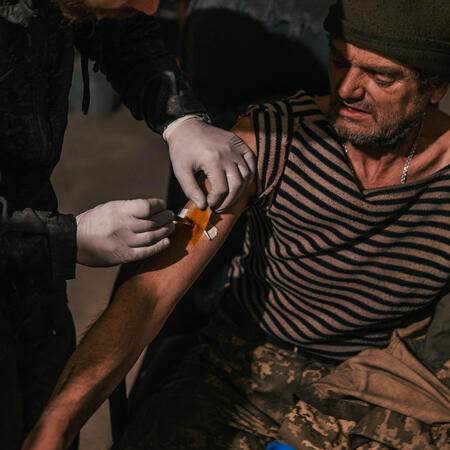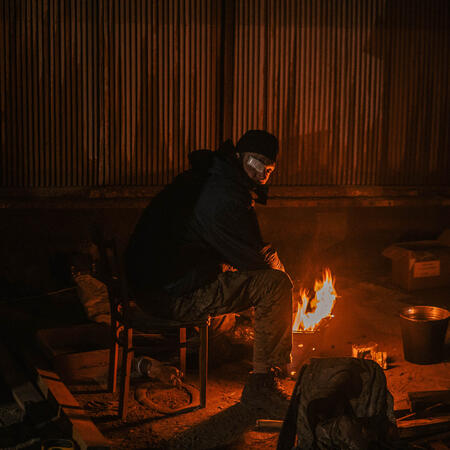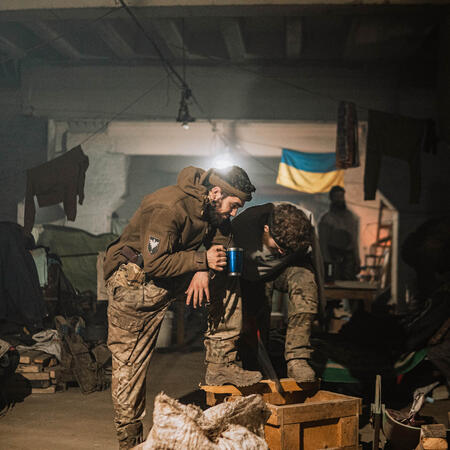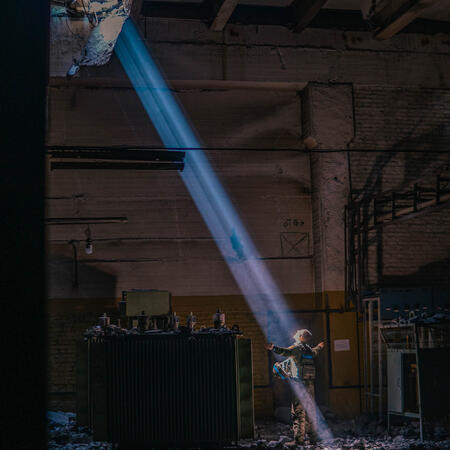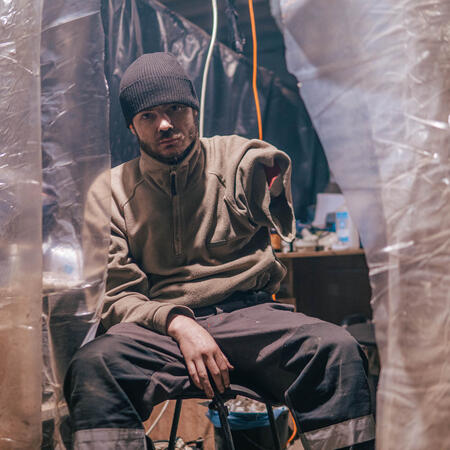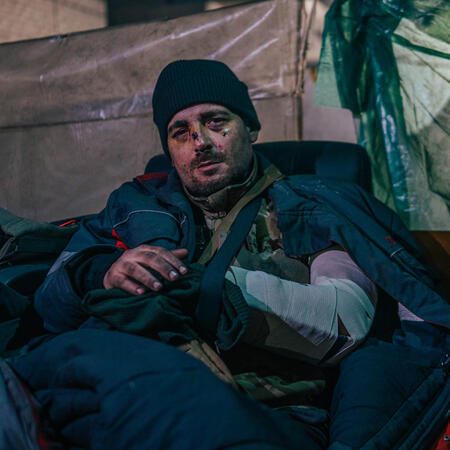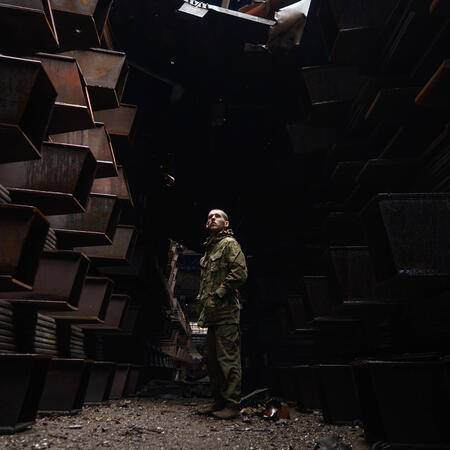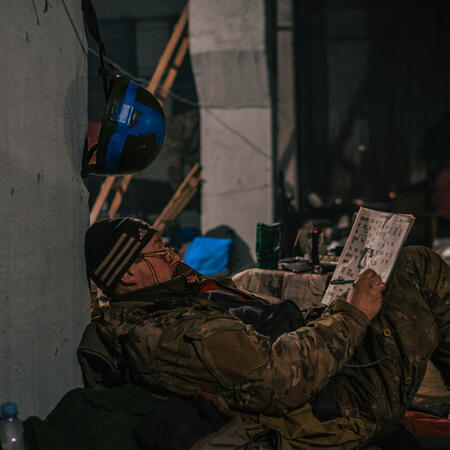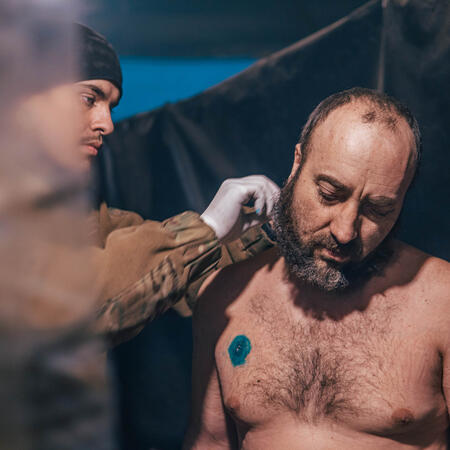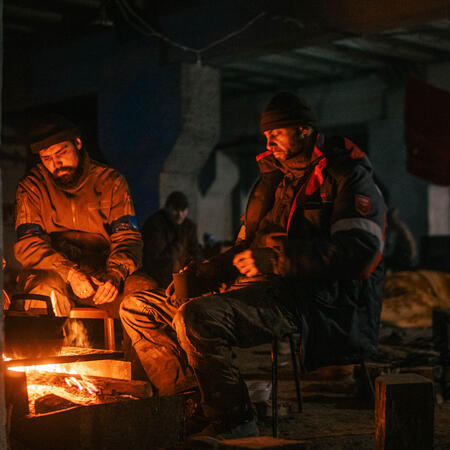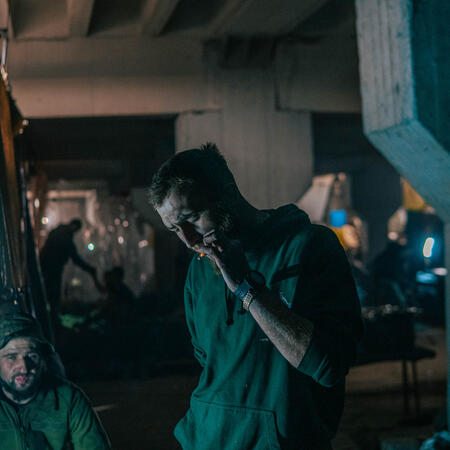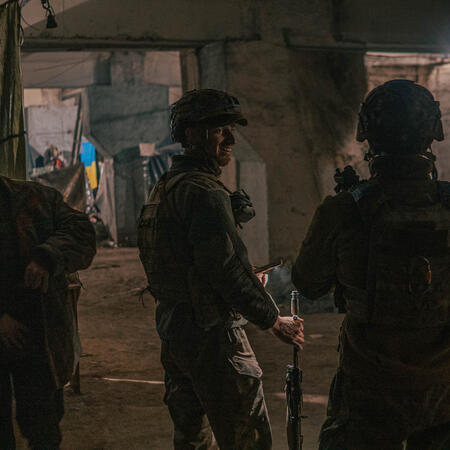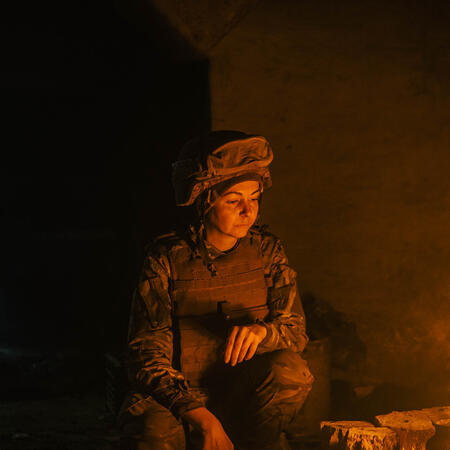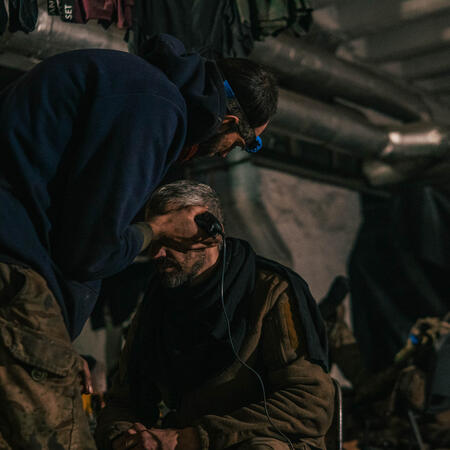On February 24, 2022, we woke up at dawn. A full-scale invasion had begun. For a week before that, there had been reports that the war was about to begin. We did not believe it was possible. And so it started...
At 5am in Kyiv, there were unprecedented traffic jams. My husband went to refuel the car. There was a huge queue. Everyone was leaving the city. Our friends called and said that they won’t let me come to Boryspil. Tariffs for taxis were five times higher than usual. There was incredible tension in the air.
Hasty packing, terrible fuss, anxiety. Martial law. Friends call and tell me to leave. Where can I go when my son has been in the war in the east of the country for seven years?
We decided not to leave, but our suitcases were packed. It started to rumble, very loud, until the ground shook. My dear son is in Mariupol. I was terrified for him. He already wanted to leave the army, to start a new peaceful life. It is unbelievable that this is a war – some terrible joke.
We didn’t sleep. Planes flew loudly, and something rumbled so hard that the windows shook. During the day, we searched for a bomb shelter or the nearest basement so that we could get there quickly. Many people left. Every step could be heard in the house.
They decided to gather the residents to find out who stayed, and they organized men to guard the entrance during the night. My dear son periodically texted me from Mariupol that the orcs were advancing, but they were defending the city well – Mariupol was under reliable control of our military. “Mom, don't worry about me, we're holding on, we won't let the enemy into the city, everything will be fine!”
My niece lives in Mariupol with her two children, boys aged 9 and 10. She says there was still food, and their phones and power banks were charged.
Then the connection was lost, there was no word for several days.
Eternity... “The subscriber cannot be reached,” says the pre-recorded message from the telephone company… Another nephew and his family – two children aged 5 and 1.5 – remain in Marinka. He texted — “Holding together.”
My niece finally called. She went to the park nearby, where she was able to get a signal. She said:
“In one day, electricity, the internet, communication – all were lost. Only gas was left. I cooked some food and heated up the apartment. The next day, the gas supply also disappeared. It was severely cold. We finished our food. There is not enough water. The products are running out. We eat a little, we save the rest. The children ask for food. Thank God, it rained. They collected water in all the dishes we had. There was already bombing in the city. Shells were flying, planes were dropping bombs. The street near the house was hit. The explosion was so strong that the windows flew out. Shrapnel cut all the houses nearby – one splinter destroyed the neighbors' building.
They were bombing the city every 10 to 15 minutes. We hide under the bed with the children. I hate the occupiers. I cry tears of helplessness and horror.
In the intervals between the shellings, we have started looking for food and water. We found a well. We ran there with the children, because they were afraid to stay in the house alone. As soon as the siren started, we leapt into a nearby pit. We ran again.
The shops are closed. Our military gave us a little food, so we can hold out a little longer. When we reached the nearby park, we saw large pits that had been dug. A truck brought human bodies there. Terror…Horror...
Again, we are sitting under the bed in a cold house, without light, heat, without water and almost without food, and there is shelling without a break. The children cry out of fear. There was an explosion nearby that made the floor jump. Later we learned that a rocket hit our school, which is across the street. Our neighbors have left. We are cut off from the world. At night I hear trucks coming to the park and unloading something…we already know WHAT.
It is impossible to fall asleep because of the terror and shelling. Oblivion ensues for an hour and a half... Some passersby who ran outside for water said that it is possible to hide in the basement of the Drama Theater and that there are already many people there. They wanted to run away, but the shelling started. One passerby fell and did not move. A day later we learned that the Drama Theater had been bombed, killing many people, two blocks from our house.
It’s a gray ghost town. It was once bright, crowded, green, and beautiful. But now it’s filled with black burnt houses, cars cut in half, with shattered fences. Corpses of civilians lie right on the road, some covered with rags. In yards and playgrounds, there are fresh piles of dirt – big, small, some with plaques or even homemade crosses. The stench of explosions mixed with the smell of rot. It’s like a terrible dream... a horror film, an apocalypse film. Three weeks in this horror is an eternity.
We started looking for a way out. We took our backpacks, went outside, and tried to hitchhike. One car stopped and picked us up and drove us to Melekyne. The whole coast was occupied. Orcs checked documents at checkpoints, threatened people with weapons, and behaved very brazenly. They beat up a boy who didn't look at them “in a polite way.” They held us for more than two hours.
In Melekyne, we were recorded. All of our data and phone numbers were taken. We were placed in a school where there were many people. There are opportunities to call, eat and drink, and charge our phones. In the evening the lights were turned off – the connection and the internet were lost. We needed to find a way to go to Berdyansk and Zaporizhzhya, to catch a private car.
But the next day no one was released from the village. In the evening at 8:00, armed orcs came and told everyone to go to the buses. There will be an evacuation, the school will be closed, the lights will be turned off. They drove us somewhere all night and brought us to Starobeshev. They said they would take us to Rostov later. My youngest son became very ill, caught a cold, had a fever and a cough. There were many sick children.
They were taken to a hospital in Donetsk. They were not allowed to go outside. After recovering, the doctor called the military, which was the order that they gave him. They were escorted to Rostov and their documents were checked. Orcs looked at correspondence on their phones and social media accounts, looking for enemies.”
We found out that they were released to relatives in Russia. They are there now, but they really want to return. They say that it is disgusting to be in a country that has taken away everything – a quiet life, home, smiles of sons, just the right to life and freedom.
The children tremble in their sleep. Hate is fierce.
In parallel with the fate of my niece, events unfolded in the family of my nephew who lived and worked on the left bank of Mariupol, near Azovstal. He rented an apartment just before the war with his wife and children (5 and 1.5 years old). They had a house in the gray area near Mariupol, but there was no work there, so my nephew worked in Mariupol on Azovstal.
When it all started, the occupiers first captured the left bank, and began bombing and leveling it. At the same time, everything was gone – light, heat, gas, internet and communication.
There were not enough clothes, household items, or food. The march to the well for water was horrible – killed civilians lay everywhere and they had to step over their bodies. When the shelling began, everyone fled, stumbling over the corpses. Food was prepared on the street using firewood. Many people died there. They sat in dirty, unfurnished, cold basements. Heavy artillery shelling and bombardment were regular occurrences. It happened every 10-15 minutes. If they were “lucky,” 30 minutes would pass without a shell flying overhead.
They ran to other basements. When the house was hit, it burned and collapsed. The Ruscists bombed a nearby food kiosk. People did not want to take anything there, because they considered it theft. But gradually they started going and taking something, because there was nothing to eat. They even took alcohol, because they said that without it, it is difficult to survive in such a hell. You can die at any moment.
They ran to the bomb shelter, covering the childrens’ eyes so that they would not look at the corpses of civilians in the streets. It was not possible to hide them, because the breaks from the shelling were used to run for water, cook food, and collect firewood. But they still managed to bury some of the corpses right in the yards.
The real horror began when the rockets began to hit neighboring houses, including the one next door. The houses caught fire and there was a black stench. People tried to run to their apartments to pick up at least some valuables.
My nephew ran to the apartment while his wife and children remained in the basement. He only managed to step aside and hold onto a small child, as debris hit a woman nearby.
The roof of the house was on fire, the entrance was darkened by smoke, and he barely managed to jump out onto the street when the burning house collapsed. Everyone ran somewhere to hide in basements. Everywhere there were screams, moans, fuss, and crying children. People are dirty, wearing torn clothes… there are only civilian, residential houses here. It is a sleeping area of Mariupol. Gradually the shelling subsided and they caught their breath in some basement. They ran on foot to the outskirts of the city, hiding in doorways to somehow escape from hell.
They were picked up by a car and it took them to Bezimenne, which was occupied in 2014.
The car was stopped by strong men with weapons in a Jeep… their hearts dropped to their heels, it's over... but Russian journalists ran up with cameras, began to film them, and the military handed them a package, probably products. They smiled at the children on camera... it was scary and then disgusting…
In this village, they spent the night in tents. There was some broadband connection. They were able to tell their relatives where they were. The village in which they were staying was completely occupied. Nearby relatives were able to come and take them home.
It didn't get much better at home, because the orcs were crawling around the yards and taking the men. The so-called draft. Better a poor horse than no horse at all.
You can hear planes and helicopters flying towards Mariupol and powerful explosions can be heard from the left bank. Apparently, they are bombing Azovstal, where there are still a lot of civilians, children, elderly, and the sick.
A terrible dream. All things burned – bank cards, the car. The children scream and tremble in their sleep. Where do you get the strength to live in this nightmare and not go crazy?
Almost a month of hell...in all the chats and groups on Facebook, I was looking for my nephews, worried about them, helping with information, waiting for a connection with my own son. He has been in Mariupol, in the military, in the Azov Regiment, for seven years.
Anxiety flashes in my brain all the time – son, how are you? He finally got in touch.
“Mom, I'm fine,” he said. “We're holding on, cutting down our enemies. I'll come home with orders and awards on my whole chest.”
"Come back, son, whatever it takes. Is there anything to eat?”
“There is a little.”
“Did you manage to get some sleep today, son?”
"No, I didn't manage, I'll go now, I'll daydream for at least an hour."
The next day I ask, “Did you manage to sleep?"
“Well, no, Mom, it didn't work out. There is a lot of work to be done. I'll come home and get some sleep. I so deeply want to take a bath and get into a clean bed. We only have wet wipes here. I will show photos of Mariupol; you will not recognize it. This is what is happening here, it's just awful. On the streets, under the rubble of apartment buildings, wounded civilians are begging for help, but we can't help everyone. We don't have time, we don't have opportunities. We have our tasks, which we do under constant fire and bombing. Of course, we try to help. It's a pity for the people, my heart is breaking. The stench, moans, cries, screams, of course, are not transmitted in the photo.”
Then there was no connection..
We were patiently waiting. Terrible news does not give peace – the city was surrounded. My beautiful son appeared on the line, finally…
“What's up, Mom? What's the situation? Are they helping us? Will they unblock the city? Who has Volnovakha now?”
“Son, there are battles in the north of Volnovakha. Our president speaks to all parliaments, on all international platforms, asking to close the sky at least over Mariupol.”
My son was silent, obviously hoping to hear something more encouraging.
“Mom, we will soon be fighting against the tanks with sticks…of course I have big plans for the future, but I want you to know, I do not regret anything.”
“Son, your birthday is March 25, maybe you will have time to win and come home to celebrate?”
"Probably not, Mom."
This conversation took place on March 18. His hometown, where my children grew up, went to kindergarten and school, where we had many relatives and acquaintances... the occupiers turned into a ghost town – a gray, scorched, dirty desert.
Again no connection with our son… we waited holding our breath... I text, I don't even read... news comes from relatives and acquaintances who managed to escape... a cousin and his family escaped from the basement, orcs have already settled in their house…
It gets a little easier, but in my mind I always remember – my dearest is still there…
We understand that there is no connection and we patiently wait, but the stress is unbearable! I wake up in the middle of the night, my heart beats, I cry like you are there, son, hold on, praying, praying…
We try to hold on, we wait for him to call. On March 25, it was his birthday. He turned 28 years old. We congratulate our son in the chat. When there is a connection, he will read and rejoice.
Please, I am writing letters with a request to unblock Mariupol and help the military in all social networks, foreign figures, bloggers, volunteers, all the time in the news – maybe there is help for Mariupol... Hopefully, we are waiting…
My son sent his belongings to Kyiv by mail on February 23. On the 24th, the parcel still hadn’t arrived. We went to the local branch and asked where the parcel was. They said to wait, it will be delivered to us soon.
We waited, we walked there again, we called them. The post office is a concrete wall. Nobody knows anything. The hotline is not working. Nobody can give any information, of course, because of the war.
They say that the parcel is in Kyiv, please wait. A month later, it was discovered that it had been mistakenly taken away by volunteers. We can't find it.
On April 7, we received a call from the regiment: “Your son died.”
…Pain.... pain, a lot of pain. This is not true... false... no... it can't be... no, it's not true...I will not accept it. No. No! No!
So many dreams, plans, hopes... he wanted to resign in January, but the commander asked him to stay a little longer... He wanted a family, children, and a civilian profession. He loved his country very much – Mariupol, Kyiv. He did not dream of living abroad; he only dreamed of traveling.
Hope is alive! He will return – it is a mistake. We fight to find the parcel – there are his things, some documents, keys to a small safe. Yesterday I learned that my sister is alive near Mariupol, but there is no connection, no food, no money…Thank God she is alive...
We live in hope…
 My name is Iryna Yurchenko. I am the mother of a soldier of the Azov Regiment Dmytro Kozatsky (call sign "Orest," 26 years old).
My name is Iryna Yurchenko. I am the mother of a soldier of the Azov Regiment Dmytro Kozatsky (call sign "Orest," 26 years old).
 On March 1, Mariupol was surrounded and the Azovs moved to the territory of Azovstal. There was almost no connection, but we sent each other messages. SMS were short: “Alive + How are you, how’s my dear sister, be careful!!! I love you!"
On March 1, Mariupol was surrounded and the Azovs moved to the territory of Azovstal. There was almost no connection, but we sent each other messages. SMS were short: “Alive + How are you, how’s my dear sister, be careful!!! I love you!"
 The defenders of Azovstal and Dima were "evacuated" from the plant on May 17-20. It was an order of the president of Ukraine: "save the lives of the military," because there were too many dead and severely wounded... When I learned about it and saw Dima in a Russian public group ALIVE!!!, I was happy beyond words.
The defenders of Azovstal and Dima were "evacuated" from the plant on May 17-20. It was an order of the president of Ukraine: "save the lives of the military," because there were too many dead and severely wounded... When I learned about it and saw Dima in a Russian public group ALIVE!!!, I was happy beyond words.
